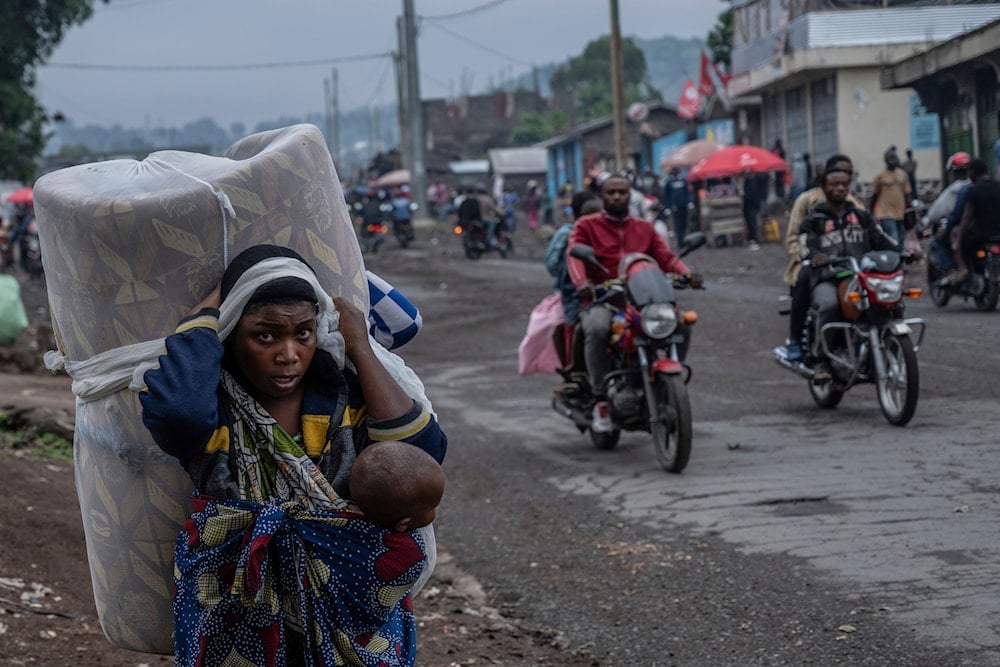DR Congo, Rwanda hold first talks after peace deal
DRC and Rwanda hold their first talks after the Doha peace deal, aiming to end decades of conflict fueled by M23 violence and competition over Congo’s mineral wealth.
-

People displaced by the fighting with M23 rebels make their way to the center of Goma, Democratic Republic of the Congo, on January 26, 2025. (AP Photo/Moses Sawasawa, File)
The Democratic Republic of Congo and Rwanda held their first formal talks on Thursday following the signing of a landmark peace agreement aimed at ending decades of conflict in eastern DRC, both governments confirmed.
The meeting, held in Washington, brought together representatives from Kinshasa and Kigali, with observers from the United States, Qatar, and the African Union. A joint statement released on social media said the delegations "discussed progress on implementing the agreement" and reaffirmed their commitment to ending hostilities.
The dialogue marks a critical development after years of failed ceasefires and mounting humanitarian crises in the region.
Violence in eastern DRC has persisted for more than three decades, particularly in mineral-rich areas bordering Rwanda. The crisis escalated earlier this year when the M23 armed group, backed by Rwandan forces, seized control of Goma in January and Bukavu in February, installing parallel administrations in both cities.
Despite previous resistance to negotiating with the M23, Congolese President Felix Tshisekedi agreed to direct talks following Qatari mediation. A peace agreement was signed in Washington at the end of June by the foreign ministers of both nations.
The Doha agreement, hailed as a breakthrough by the African Union and United Nations, includes provisions to respect territorial integrity and halt hostilities in eastern DRC. However, many of its economic measures remain unspecified.
M23 conflict and humanitarian crisis continue
Though the frontlines have stabilized since February, sporadic violence between M23 and pro-Kinshasa militias continues. According to the Congolese government and the United Nations, thousands have been killed, and hundreds of thousands remain displaced.
The humanitarian toll remains severe, with local and international agencies warning of ongoing instability in affected regions.
In a separate Qatar-led track, the Rwandan-backed M23 armed group and Kinshasa signed a declaration of principles earlier this month. The declaration included a commitment to a permanent ceasefire and dialogue aimed at facilitating the voluntary return of refugees and internally displaced persons.
President Tshisekedi, after initially refusing direct talks with M23, agreed to engage with the group under the framework of the Doha agreement. Kinshasa and the M23 have committed to implementing the declaration by July 29, with formal negotiations on a comprehensive peace accord set to begin by August 8. The final agreement is expected to be signed by August 17.
Read next: Scramble for DRC critical minerals highlights the farce that is ‘Just Transition’
Analysts caution that the timeline is ambitious, especially as disputes persist over the M23's withdrawal from areas under its control.
The region's vast mineral wealth is a driving factor in both the conflict and international interest. The DRC is the world’s leading producer of cobalt and possesses significant reserves of gold, coltan, and lithium, critical minerals for the global tech and energy sectors.
In April, President Tshisekedi discussed access to the DRC’s minerals with US special envoy Massad Boulos. On July 17, the DRC signed an agreement with US-based Kobold Metals to digitize geological data and develop a lithium mine in the country’s southeast.
These developments highlight the growing geopolitical stakes tied to Congo’s resource-rich territories, even as diplomatic efforts continue to bring lasting peace to a region long scarred by conflict.

 3 Min Read
3 Min Read










